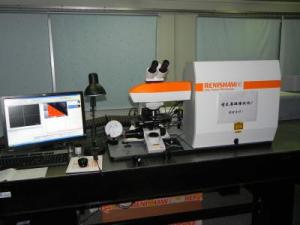Sep 5 2014
Researchers at Guangdong Medical College have discovered that the combination of serum surface-enhanced Raman scattering (SERS) spectroscopy and support vector machine (SVM) diagnostic algorithm demonstrated great potential for non-invasive screening of prostate cancer.
Screening for cancer can help prevent related deaths. Many methods exist, but there is a growing need for more effective, safe and cost-effective methods.
 A team led by researchers at Guangdong Medical College in China has demonstrated the potential of a new, non-invasive method to screen for prostate cancer, a common type of cancer in men worldwide. Credit: S.Li/Guangdong Medical College, China
A team led by researchers at Guangdong Medical College in China has demonstrated the potential of a new, non-invasive method to screen for prostate cancer, a common type of cancer in men worldwide. Credit: S.Li/Guangdong Medical College, China
The research team was led by Shaoxin Li. They tested SERS with the advanced SVM technique in the laboratory. 'SERS spectroscopy' of silver nanoparticles was combined with SVM and mixed with blood samples that were collected from healthy people and from people who had prostate cancer. The novel technique demonstrated an accuracy of 98.1%. Li stated that the new prostate cancer screening method was simple, extremely sensitive and non-invasive.
Prostate specific antigen-based screening has been widely used for diagnosing prostate cancer. This test checks for elevated PSA levels, which can be caused by factors not related to cancer. Many researchers had considered using SERS as they were sensitive enough to spot minor signals of proteins or DNA that could be considered as an indication for cancer.
However, the signal differences were too minor for detection. The present study utilized the SVM spectral data processing algorithm, which helped them observe the difference and confirm presence of cancer.
The researchers have published their study in Applied Physics Letters from AIP Publishing.